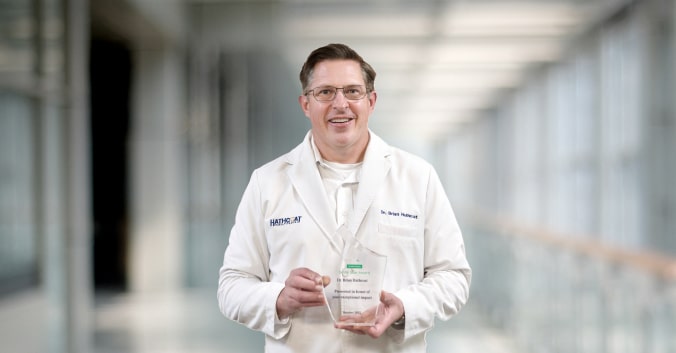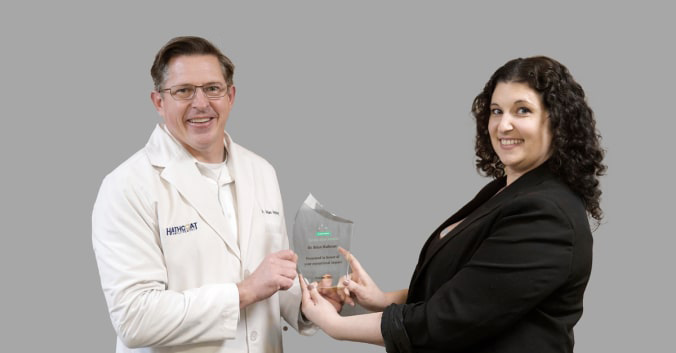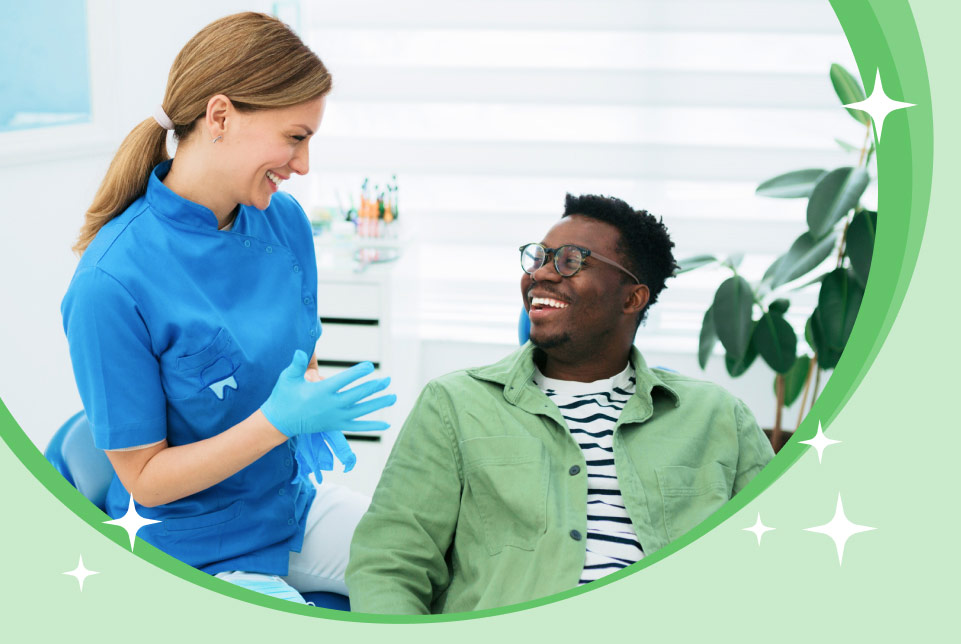
Dr. Brian Hathcoat — how a career change and a commitment to service made a positive impact
Each quarter, we highlight dental professionals and office staff who have been nominated by their peers in recognition of their exceptional work for both their patients and their communities. We’re proud to announce our latest winner, Dr. Brian Hathcoat.
Dr. Hathcoat’s practice is in the San Francisco Bay Area. We talked to him recently about his life, career and his commitment to community service.
Tell us about yourself and how you got to where you are today.
I'm originally from Kansas and grew up mostly in the Midwest. My father was in the Air Force, so we moved around quite a bit. I lived in Kansas, California, Hawaii, Illinois, and then back to Kansas where I went to high school in the Kansas City metro area.
Throughout my childhood I was active in sports, various academic and leadership activities. In high school, I wrestled, ran cross country and played tennis. After that, I went to college at the Naval Academy, where I attended for 2 ½ years. I did not thrive in the military academic environment, so I resigned my appointment and served two years in the U.S. Navy.
After that, I moved to California to finish my education. I attended UC Berkeley where I earned Bachelor’s and Master’s degrees in mechanical engineering. I worked as a mechanical engineer at a national lab for seven years after graduation.
Why did you decide to become a dentist?
After a few years as an engineer, I became dissatisfied with the career and felt I had more value to offer my community and myself.
While researching other careers, I talked with a good family friend who was a dentist. I shadowed him and really liked what I saw. Soon after, I started taking dental school prerequisite courses and found my way into dental school and into dentistry.

What does a typical day look like for you?
I typically get to the office between 6:30 am and 7:00 am to plan my day, take care of any unfinished work, and review the day’s patients. We see patients from 8:00 am until 5:00 pm and do a variety of general dentistry procedures. We really focus on establishing relationships with our patients.
I'II typically see 6 to 8 patients a day and our hygienist sees 8 patients a day. We maintain a full schedule and keep our days busy, which helps most days go by quickly.
Can you tell us a little bit more about your volunteer work and involvement in the community?
I've been involved in volunteer work throughout my life. When I was applying to dental school, I made a promise to myself that if I did get into dental school and was blessed to have this skill set, that I would use that power for good, so to speak. Throughout dental school, I volunteered when I could. My first clinical experience after dental school was working for the Berkeley Free Clinic, which is a non-profit organization in the [San Francisco] Bay Area, and then just kind of fell into getting more involved in community dentistry.
In 2017, while volunteering at BFC, I partnered with a colleague and we co-founded a non-profit: Just Health 510. I helped develop and serve that organization through the beginning of 2020, when I scaled back on my community work to focus on myself, my family and private practice. I continue to volunteer regularly with a few organizations.
Since 2017, my big event is coordinating the dental clinic for a biennial Veterans Stand Down. At this event, at-risk for homelessness vets are given access to a variety of social services including medical, dental, legal, housing, clothing, and job development. Over the three-day event, we serve between 100-150 vets and provide them with exams, cleanings, fillings, extractions, dentures, and community referrals. It’s needed and rewarding work.
What would you say has been your most memorable experience in doing that work?
I have helped a lot of people out of pain and get their smile back, just by providing comprehensive community dental care. It’s rewarding to give people back their ability to smile, chew and function.
My most memorable experience was, from a treatment perspective, a simple filling, but had significant impact on the patient’s life. She had a large, darkly discolored cavity on one of her front teeth. It kept her from smiling: she would curl her lips over her teeth to hide her smile from the world. It significantly affected her self-esteem and she was having trouble finding work.
With the simple act of placing a filling, she immediately transformed from being tight-lipped to having a full-face, glowing smile. It still amazes me that a treatment I consider routine can have such a big impact on somebody's life. Soon after having her tooth fixed, she got back in the workforce and is doing well in life.
What do you think the future holds for the dental industry?
Technology is going to continue to play a major part in the dental field. Even in my relatively short career, the advancements I’ve seen in digital dentistry have been amazing.
At times, it feels like it’s moving too fast and it can be exhausting trying to keep up with all the advancements. However, I love learning and these advancements are leading to better, more predictable and longer-lasting treatment outcomes.
So what do you like to do in your free time?
I like exploring our world and being outside. I’ve done a lot of hiking in the the past few years along with a few backpacking trips which I really enjoyed.
I also enjoy photography and hiking has provided a great canvas for capturing the beauty of the natural world. I enjoy live performances and go to concerts, plays and musicals every chance I get. I enjoy cooking and am happy to spend a little extra money to have a food experience.
What's some advice you would give to recent graduates of dental school when they're starting out?
I think first and foremost you need to make sure that you take care of yourself. Dentistry is a demanding profession, both mentally and physically. If you don't take care of yourself, it's hard to take care of others. Take the time to work out, meditate or just find something that'll give you a little bit of freedom and vacation from dentistry. It will pay big dividends in the long run.
Make sure to take care of your patients too. When you provide the same level of care to your patients that you would to your family and friends, nothing but good things will happen.
Stay active in the dental community, whether it be through study clubs, dental societies or just meeting and collaborating with colleagues. As a solo practitioner, it's easy to feel like you're alone on an island and just kind of all by yourself. So, interacting with colleagues and other people in the field is a good way to stay connected, learn new techniques and resolve issues we all face. You not only learn a lot of new techniques and new ways of doing things, but you can also try and find solutions to some of the problems that arise on a a daily basis.
Enjoy what you do and remember why you got into the field, where that initial passion was born, and work to maintain that passion.
Thank you, Dr. Hathcoat, for taking the time for an interview and for all that you do for your patients and your community. Congratulations on being chosen as a Smile Star.
You can visit Dr. Hathcoat’s practice’s website for more information.
Do you know someone who should be a Smile Star? Email us at smileaward@delta.org with their contact information and the reason your nominee should win this award.
Recent posts
- Oral health care for seniors: Improving access, improving outcomes
- Simplify your credentialing with CAQH: Check out our webinar recordings
- Updated 2026 CDT codes are here
- View our CDT 2026 Updates webinar and stay on top of code changes
- EFT will become our standard payment method starting 1/1/27
- Start the year strong: Key reminders to support your practice in 2026
- Discover 3 tips to power up your practice with new workflows
- Updated 2026 CDT codes are here
- Partner with us to improve the health outcomes of our shared members
- Say hello to our 2026 Medicare Advantage DHMO partners
